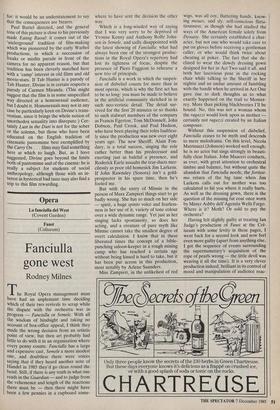Cinema
Lust in the Dust (`15', selected cinemas)
Going ape
Peter Ackroyd
The star of this odd but amusing film, Divine, is, not to put too fine a point on it, a 20-stone transvestite; he looks like a cross between Medea, Mae West and a baby elephant; he is a femme fatale who literally crushes men between his thighs while at•the same time pouting and squeak- ing in the best Hollywood tradition. One would need the entire contents of Harrod's cosmetic department to powder his fair cheeks and, although he possesses what under other circumstances would be de- scribed as a 'cruel' mouth (it looks like the undercarriage of a B2 bomber), it is his girlish voice which actually creates the most havoc. He is, in other words, a demented creature who despite appear- ances has very little to do with the usual transvestitic parodies of women: Divine is a grotesque, a genuine nihilist, who is parody- ing the entire human race. He would be more at home in the pages of Swift than on the boards of a pantomime stage.
On this occasion his energies are chan- nelled into a film which takes the plot and setting of the ordinary 'Western' in order to disgorge them all over the audience. It also 'stars' Tab Hunter, a quondam heart- throb who is smart enough to have realised that the business of being a film-actor is a terrible joke and has, as they say in the newspapers, made his arrangements accor- dingly. Here he parodies his earlier fame as a 'sex symbol' while at the same time scoring a few palpable hits off that card- board creature known as the 'strong silent type' and generally to be seen imperson- ated by Mr Clint Eastwood. He looks nothing but wooden, and says nothing which is not boring, and gives a perfect imitation altogether. The Western itself is particularly useful for the parodist, of course, since it is established upon a series of conventions which, like the recipe for a peculiarly repellent form of Christmas pud- ding, are never supposed to change. And so, in Lust in the Dust, we have the pietistic allusions as well as the sexual violence (the latter generally perpetrated by Divine, however) the ritualised landscape as well as the climax of a multi-layered gun fight.
The film opens with the spectacle of Divine, dressed in what can only be de- scribed as a Spanish duenna's costume, struggling across the New Mexican desert with an umbrella which is actually a size smaller than his raven-haired wig; it is only a matter of time before he plunges to his knees, intoning 'Though I walk in the shadow of death' before becoming thor- oughly confused about the rest of that notorious passage. In the next scene he is `surprised' by a man while bathing, although the real surprise is that he can enter the small creek at all; the fact that he looks like a rhinoceros who has messily eaten a lipstick does mean, however, that he is in no danger of having 'my innermost parts violated' as he keeps on insisting Will happen. I have expatiated on Divine only because he automatically dominates any film in which he appears (as those who had the experience of seeing Polyester Will never forget); this means that only the scenes which include him can really live up to the comic potential of the film, and where he is absent Lust in the Dust relapses into a witty but on the whole conventional parody. There is a plot concerning hidden gold (the secret of which is to be dis- covered in a limerick which begins 'There was a young man of Scotland'), but unfor- tunately Divine's magisterial presence is not to be found there. In fact the real theme of the film has nothing whatever to do with the plot at all, since its only concern is to display Divine being accosted or ravished by a variety of men who do not realise what they are letting themselves in for: it would be an understatement to say that the consequences are bizarre. Paul Bartel directed, and the general tone of this picture is close to his previously made Eating Raoul: it comes out of the `underground' tradition of film-making which was pioneered by the early Warhol productions, in which a succession of freaks or misfits parade in front of the camera for no apparent reason, but that tradition has been cleverly matched here with a 'camp' interest in old films and old movie-stars. If Tab Hunter is a parody of Tab Hunter, Divine is in certain respects a parody of Carmen Miranda. (This might suggest that the film is in some unspecified way directed at a homosexual audience, but I doubt it. Homosexuals may not in any case be particularly keen on Divine's trans- vestism, since it brings the whole notion of unorthodox sexuality into disrepute.) Cer- tainly Lust in the Dust is not for the sober or the solemn, but those who have been educated on the English tradition of cinematic pantomime best exemplified by the Carry On . . . films may find something here at which to laugh. But, as I have suggested, Divine goes beyond the limits both of pantomime and of the cinema: he is really a subject for students of social anthropology, although those with an in- terest in hysterical bad taste may also find a trip to this film rewarding.



































































 Previous page
Previous page